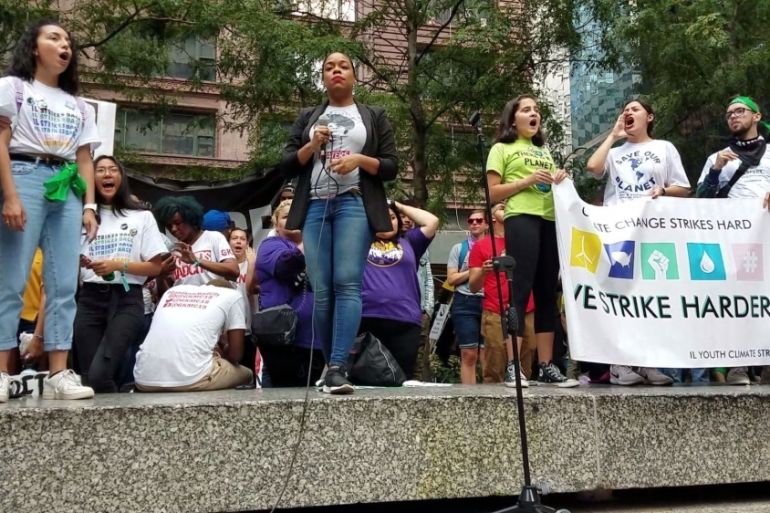Black women need to be leaders, not martyrs
When those closest to the pain are closest to the power, the US will experience a true transformation.

The recent shooting of 28-year-old Atatiana Jefferson by a police officer hit me hard because that could have been me in her shoes. This incident was one more reminder that black men and women in America live under constant state-sanctioned violence. When we are not even safe in our own homes, we need to have a real conversation about how excessive use of guns by police is gun violence.
Born and raised on the West Side of Chicago, I grew up in the Austin neighbourhood with some of the highest levels of poverty in the city. When I was seven, I saw a child shot and murdered in front of my home. I knew the victim, I knew the shooter, and the experience changed my life. I decided to run for Congress in the Illinois 7th Congressional District because after years of advocating, organising and speaking out against gun violence, I found that the best way to have a lasting impact was to change the policies that prop up these broken systems in the first place.
Keep reading
list of 3 itemsUS: White officer charged with murder in shooting of black woman
The long history of black Americans being told to ‘go back’
And it is not just the bullets flying in the air that are killing us. It is the segregation in our cities that targets black and brown neighbourhoods for public school shutdowns, keeps lead in our water, toxins in our air, and relies on the Cook County Jail to be the biggest provider of mental health services. There is a 30-year life expectancy gap based on zip code in my district that is drawn clearly along racial and class lines, and gun violence is only one contributing factor.To save lives we cannot just proceed with business-as-usual leadership. A major shift in our culture and our way of being is on the horizon.
The job description for Congress has changed – It’s time to pursue a bold progressive platform that includes Medicare for All, a Green New Deal, criminal justice reform, and a future – free of gun violence.#ItsOurTime to lead in #IL07. @Kina4Congress -> https://t.co/6Pra3VreTQ pic.twitter.com/x0zCJjb43s
— Black Lives Matter (@KinaCollins__) September 19, 2019
As the youngest black woman to ever run for Congress in Illinois, I know that people who look like me are not expected to have a voice in politics. Black women are expected to be the saviours, but we have not had the access to land, wealth, and power for generations that are needed to break into the political world.
It can be a huge personal sacrifice as a black woman to run for office without the financial safety net that other types of candidates have. We must rely on individual donations and our own personal networks to build grassroots campaigns from the ground up. Even with community support we still struggle to make ends meet during elections.
If black women are the backbone of the American political system, imagine how much more we can do when it is not just our voting power but our governing power that is guiding decisions in this country. As Shirley Chisholm said: “Our country needs women’s idealism and determination, perhaps more in politics than anywhere else.” When black women show up to the polls they vote with a moral fibre and collective consciousness to protect our entire country.
The civil rights movement of our generation must be led by us. Our civil rights fight is for transformational policies like Medicare for All, a Green New Deal, and equal opportunity and protection for everyone. It is intersectional and includes the LGBTQIA+ community, immigrants and refugees, Indigenous folks, people with a wide array of abilities, and youth who know the truth about the world that is being left to them.
No longer will black women be the martyrs who are sacrificed to maintain broken social institutions. I will always honour the names of Atatiana Jefferson and Sandra Bland and Rekia Boyd, but black women need to be allowed to lead and inspire while we are still alive and not just when we become another hashtag.
It is our time to be the leaders we want to see for the future – at the ballot box and in Congress. We deserve to have our voices heard and to represent those before us who have been silenced. When those closest to the pain are closest to the power, that is when we will see true transformation in this country.
The views expressed in this article are the author’s own and do not necessarily reflect Al Jazeera’s editorial stance.
